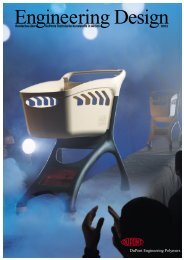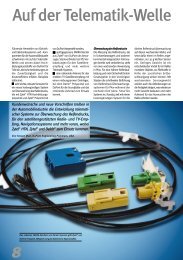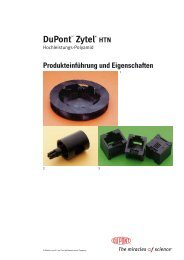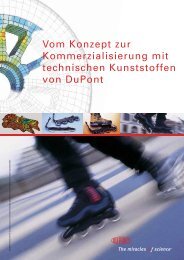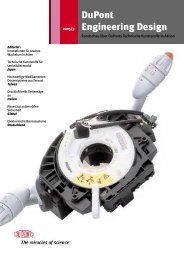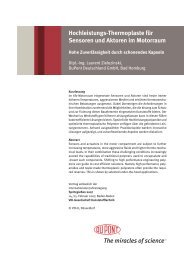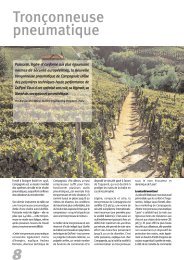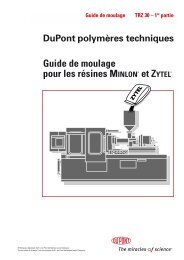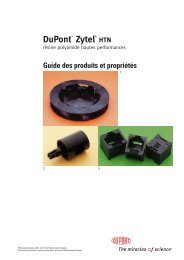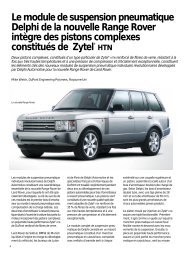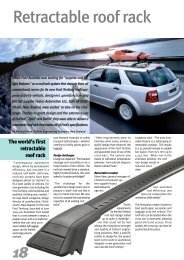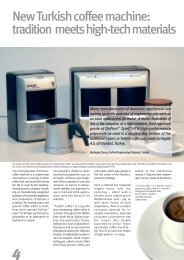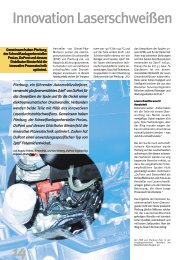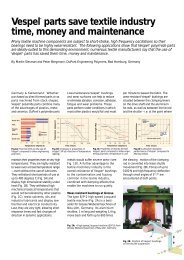General Design Principles for DuPont Engineering Polymers - Module
General Design Principles for DuPont Engineering Polymers - Module
General Design Principles for DuPont Engineering Polymers - Module
You also want an ePaper? Increase the reach of your titles
YUMPU automatically turns print PDFs into web optimized ePapers that Google loves.
Test results on gears of Delrin ® acetal resin and Zytel ®<br />
nylon resin are shown in Figures 9.02 and 9.03.<br />
Figure 9.02 is based on injection molded, continuously<br />
lubricated gears of Zytel ® 101 running against<br />
each other. Figure 9.03 is based on injection molded,<br />
continuously lubricated gears of Delrin ® 500 running<br />
against each other. The lines have been reduced 25<br />
percent below the lines which represent actual failure<br />
of the gears on test. The tests were run at room<br />
temperature conditions. Cycle life is simply the total<br />
revolutions of the gear. Caution should be exercised in<br />
using this data <strong>for</strong> gear teeth larger than 16 pitch or<br />
smaller than 48 pitch.<br />
Since this data was based on injection molded gears<br />
running in a room temperature environment with<br />
continuous lubrication, a design factor “K,” Tables<br />
9.01 and 9.02 should be applied to compensate <strong>for</strong> cut<br />
gears vs. molded gears, initial lubrication vs. continuous,<br />
pitch line velocity and tooth size (diametral pitch)<br />
Figure 9.02 Maximum bending stresses <strong>for</strong> gear teeth<br />
of Zytel ® nylon<br />
Bending Stress, × 1,000 psi<br />
Cycle Life, Millions<br />
Figure 9.03 Maximum bending stresses <strong>for</strong> gear teeth<br />
of Delrin ®<br />
50<br />
Table 9.01<br />
Values of <strong>Design</strong> Factor K, Zytel ®<br />
P.L. Velocity,<br />
Teeth Lubrication* fpm Pitch K Factor<br />
Molded Yes below 4000 16–48 1.00<br />
Molded Yes above 4000 16–48 0.85<br />
Molded No below 1600 16–32 0.70<br />
Molded No above 1600 16–32 0.50<br />
Molded No below 1000 32–48 0.80<br />
Cut Yes below 4000 16–48 0.85<br />
Cut Yes above 4000 16–48 0.72<br />
Cut No below 1600 16–32 0.60<br />
Cut No above 1600 16–32 0.42<br />
Cut No below 4000 32–48 0.70<br />
* Yes—refers to continuous lubrication<br />
No—refers to initial lubrication<br />
Table 9.02<br />
Values of <strong>Design</strong> Factor K, Delrin ® *<br />
MTL Mating Gear<br />
Teeth Material Material Lubrication** Pitch K Factor<br />
Molded 500 500 Yes 20–32 1.00<br />
Molded 500 500 No 20 0.45<br />
Molded 500 500 No 32 0.80<br />
Molded 100 100 Yes 20–32 1.40<br />
Molded 100 100 No 20 0.50<br />
Molded 100 Hob Cut Steel Yes 20 1.20<br />
Molded 100 Hob Cut Steel No 20 0.80<br />
* Values based on maximum pitch line velocity of 1600 fpm.<br />
** Yes—refers to continuous lubrication<br />
No—refers to initial lubrication<br />
variations. Thus, multiply the allowable tooth bending<br />
stress obtained from Figures 9.02 and 9.03 by “K.” In<br />
addition, the allowable tooth bending stress should be<br />
modified by the ratio of the yield strength at operating<br />
temperature to the yield strength at room temperature.<br />
Again, the effect of environment on fatigue and<br />
thermal aging must also be considered.<br />
The “K” factors in Table 9.01 are based on molded<br />
gears of Zytel ® nylon resin running against each other<br />
and cut gears of Zytel ® nylon resin running against cut<br />
gears of Zytel ® nylon resin. Zytel ® nylon resin running<br />
against steel should provide higher “K” factors<br />
because steel is a good conductor of heat and the heat<br />
buildup due to friction is less. There is no test data.<br />
However, many years experience in a multitude of<br />
steel to Zytel ® nylon resin applications would support<br />
this contention. As can be seen from Table 9.02, a<br />
higher “K” factor does exist when Delrin ® acetal resin<br />
is run against steel rather than itself with initial<br />
lubrication. It should be noted that Delrin ® acetal resin<br />
does not run against itself as well as Zytel ® nylon<br />
resin does against itself when there is little or no<br />
lubricant present. Also note that Delrin ® 100 per<strong>for</strong>ms<br />
about 40 percent better in gear applications than



